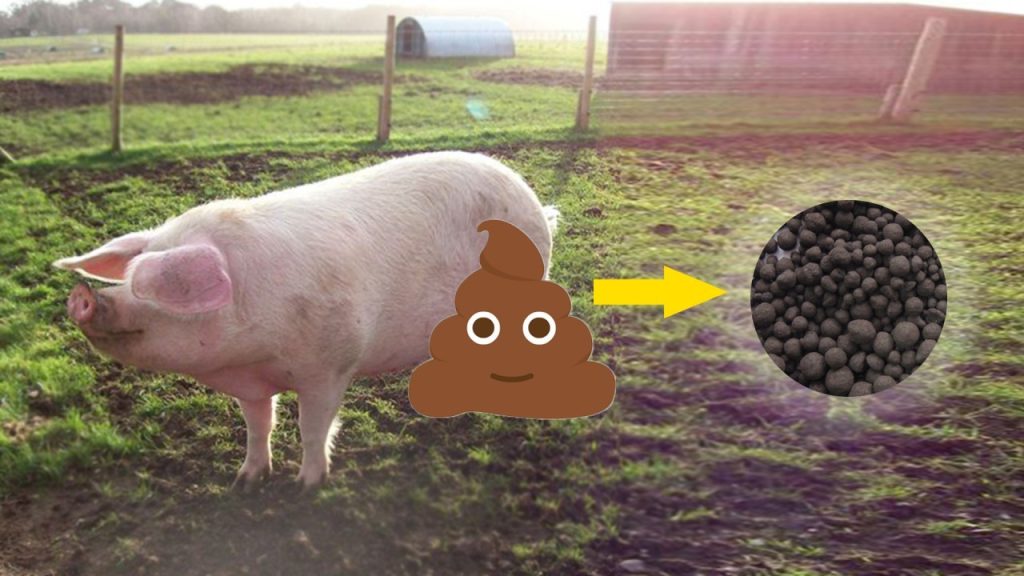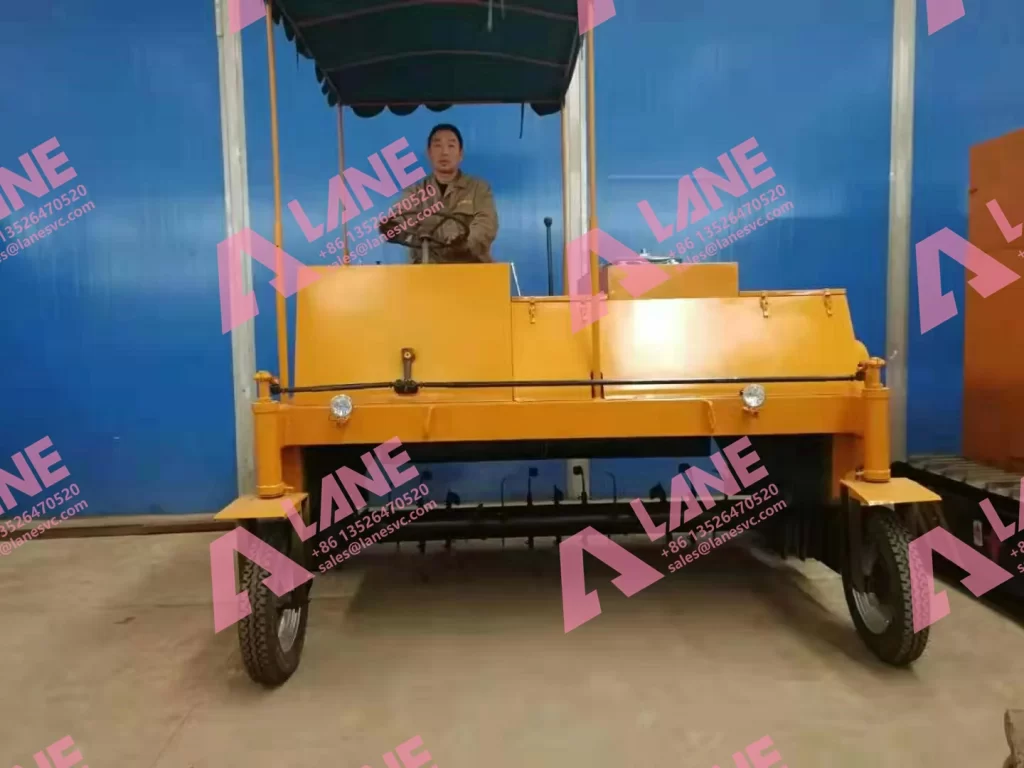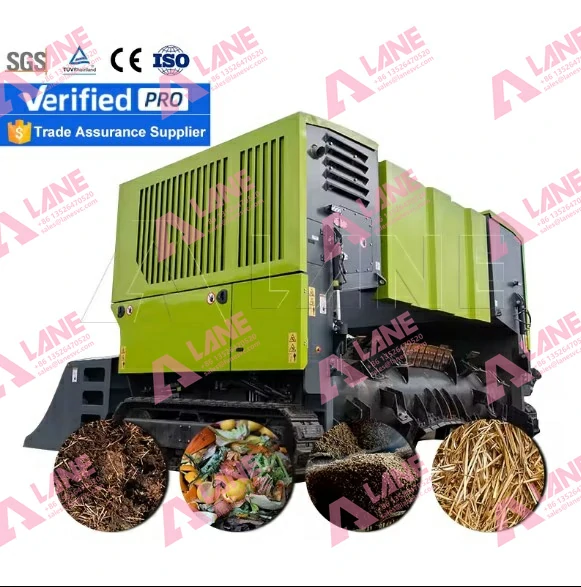Compost turner machine for pig manure composting plays a vital role in modern livestock waste management and organic fertilizer production line. Piggeries generate a large amount of manure every day, and improper handling can lead to pollution, greenhouse gas emissions and hygiene problems. With the help of efficient machines, composting can transform untreated manure into valuable organic fertilizer, thereby enriching the soil and supporting sustainable agriculture.

The compost turner machine can ensure a faster, safer and more uniform composting process. By regularly aerating the compost pile, maintaining the optimal moisture level and ensuring temperature balance, this machine converts pig manure into a stable and nutrient-rich product, suitable for both organic and conventional agriculture.
Why Compost Pig Manure?
Environmental Protection: Reduces water and air pollution caused by untreated manure.
Pathogen Control: High temperatures during composting kill harmful bacteria, viruses, and parasites.
Odor Reduction: Aeration significantly decreases foul smells compared to static piles.
Nutrient Recycling: Pig manure is rich in nitrogen and phosphorus, which are valuable for soil fertility.
Market Value: Finished compost can be sold as organic fertilizer, providing farmers with extra income.
How a Compost Turner Machine for Pig Manure Composting WorksHow a Compost Turner Machine for Pig Manure Composting Works
The composting of pig manure is essentially a biological process, where microorganisms break down organic matter into stable, humus-like fertilizer. A compost turner machine for pig manure composting accelerates and regulates this process by providing oxygen, controlling moisture, and maintaining an even temperature throughout the compost pile.
Here is how the machine works step by step:
1. Feeding and Pile Setup
Fresh pig manure, often mixed with crop residues such as straw or sawdust to balance the carbon-to-nitrogen (C:N) ratio, is formed into long windrows or placed in fermentation grooves. The compost turner is then positioned at one end of the pile.
2.Aeration and Oxygen Supply
As the compost turner moves forward, its blades, paddles, or wheels lift and flip the manure. This action breaks up compacted material, allowing oxygen to penetrate the pile. Aeration is critical because microorganisms need oxygen to decompose organic matter efficiently and generate the high temperatures required for pathogen destruction.
3.Heat Redistribution
During active composting, temperatures can reach 55–65°C in the center of the pile. The turner mixes the hot interior with the cooler outer layers, ensuring that all parts of the pile experience uniform heating. This prevents anaerobic pockets that can cause odor and incomplete decomposition.
4.Moisture Regulation
The turning action distributes moisture evenly throughout the compost. If the pile is too wet, turning allows excess water to evaporate; if too dry, water can be added during turning to restore balance. Ideal moisture levels for pig manure composting are around 55–65%.
5.Homogenization of Materials
Pig manure alone is too dense for proper composting. By mixing in bulking agents like rice husks, straw, or biochar, the turner ensures a consistent texture. This improves porosity, enhances microbial activity, and leads to a more uniform finished product.
6.Continuous Process
Depending on composting conditions, the machine may be used every 2–3 days. Over a period of 30–60 days, the manure gradually transforms into mature compost, dark brown in color, with a crumbly texture and earthy smell.
7.Output and Further Processing
The mature compost can then be used directly in fields or further processed in an organic fertilizer production line (e.g., granulation, drying, packaging).
Types of Compost Turner Machines for Pig Manure Composting
Choosing the right compost turner machine for pig manure composting depends on the size of the farm, available space, and the volume of manure to be processed. Each type of machine offers distinct advantages for different composting environments.
1. Crawler Type Compost Turner
How it works: Equipped with crawler tracks, this machine moves directly over windrows, turning and aerating pig manure piles outdoors.
Advantages:
Highly mobile and flexible for open-field operations.
Capable of handling long windrows and large volumes of manure.
Faster fermentation due to deep and thorough turning.
Best for: Medium to large pig farms with outdoor space and high manure output.
Limitation: Requires open land and cannot be used effectively in enclosed facilities.
How it works: Designed for large fermentation grooves, the wheel type compost turner moves on rails and uses a giant turning wheel to aerate and mix manure.
Advantages:
Handles massive piles with minimal energy consumption.
Suitable for industrial-scale composting facilities.
Can operate continuously, reducing labor needs.
Best for: Large commercial operations or centralized manure treatment plants.
Limitation: High initial investment and requires fixed trench structures.

How it works: Operates on tracks inside narrow composting grooves or channels, moving back and forth while turning pig manure.
Advantages:
Efficient for enclosed or semi-enclosed facilities.
Maintains stable conditions for year-round composting.
Can be combined with automatic feeding and discharging systems.
Best for: Farms with limited outdoor space or areas with strict environmental regulations.
Limitation: Requires pre-built concrete grooves, increasing infrastructure costs.
4.Remote Control Crawler Compost Turner
How it works: The remote control crawler compost turner uses crawler tracks to move across windrows of organic waste. Controlled remotely, the operator can adjust the speed, direction, and depth for precise turning without being in close proximity.
Advantages:
Highly mobile: Moves easily over uneven terrain and large compost piles.
Remote operation: Safe, convenient control from a distance.
Efficient: Reduces composting time by ensuring even aeration and mixing.
Labor-saving: Less manual labor required for large-scale composting.
Best for: Medium to large-scale farms and industrial composting operations.
Limitation: Not ideal for small-scale operations or confined spaces due to its size and complexity.

Case Example: Pig Farm in Vietnam
In central Vietnam, a medium-sized pig farm with nearly 2,000 pigs is facing severe challenges in managing its manure. Every day, the farm produces several tons of fresh pig manure, which emits a foul odor, attracts flies, and leads to complaints from the nearby community. The farm initially attempted to use the traditional static composting method, placing the pig manure in an open area. However, this method was slow – it took over 90 days to reach a partial stable state – and often resulted in incomplete composting of some of the pig manure, with lingering odors and unstable quality.
To solve this problem, the farm adopted a compost turner machine for pig manure composting, specifically a crawler type model designed for outdoor windrow operations. With this machine, manure mixed with rice husks and straw was formed into long windrows. The compost turner was used every two to three days to flip the piles, introducing oxygen and redistributing heat and moisture.
The effect is remarkable. The composting time has been shortened to approximately 40-45 days, which is almost half of the previous time. This machine ensures that all the manure reaches a high temperature of 55-65°C, effectively killing pathogens and weed seeds. The odor has significantly decreased, improving the local air quality and easing the tensions with neighboring villages.
After the composting process is completed, the texture becomes dark and brittle, rich in organic matter and nutrients. The compost is applied to the rice fields and vegetable plots in this area, reducing the reliance on chemical fertilizers and improving soil fertility. Farmers have noticed an increase in crop yields and enhanced soil water retention capacity.
This case shows how a compost turner machine for pig manure composting can transform waste management on pig farms. By turning a pollution problem into a resource, the farm not only improved its environmental footprint but also created a sustainable fertilizer source for local agriculture.
Before vs. After Using a Compost Turner Machine for Pig Manure Composting
| Aspect | Before (Traditional Static Composting) | After (With Compost Turner Machine) |
| Composting Time | ~90 days or longer | ~40–45 days |
| Odor Control | Strong foul smell, complaints nearby | Odors significantly reduced |
| Temperature Distribution | Uneven; outer layers stayed cool | Uniform; all material reached 55–65°C |
| Pathogen/Weed Seeds | Often not fully eliminated | Fully destroyed by thermophilic stage |
| Moisture Balance | Piles often too wet or too dry | Even distribution across the pile |
| Compost Quality | Inconsistent, partially decomposed | Dark, crumbly, nutrient-rich |
| Environmental Impact | Risk of pollution and community issues | Cleaner, safer, and eco-friendly |
| Fertilizer Use | Limited, unreliable results | Effective organic fertilizer for crops |
LANE’s Role in Compost Turner Technology
LANE provides a full range of compost turner machines for pig manure composting, from crawler and groove types to large wheel turners. Their machines are designed for efficiency, durability, and adaptability to different farm sizes. With global experience in organic fertilizer production, LANE helps farmers integrate composting into complete production lines, ensuring waste is managed effectively while creating economic value.
Using a compost turner machine for pig manure composting provides pig farms with an efficient and environmentally responsible method of managing livestock waste. By reducing composting time, eliminating odors, and producing high-quality organic fertilizer, these machines turn a potential pollution source into an agricultural asset.
With proper use, pig manure composting not only improves soil fertility but also supports sustainable farming practices and reduces reliance on chemical fertilizers. This approach helps farmers close the loop between animal husbandry and crop production, creating long-term benefits for both agriculture and the environment.
For more details, please feel free to contact us.
Henan Lane Heavy Industry Machinery Technology Co., Ltd.
Email: sales@lanesvc.com
Contact number: +86 13526470520
Whatsapp: +86 13526470520